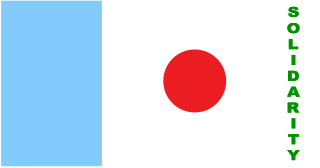
Jamaat-e-Islami,, abbreviated JI, is a socially conservative and Islamist political party based in Pakistan. Its objective is the transformation of Pakistan into an Islamic state, governed by Sharia law, through a gradual legal, and political process. JI strongly opposes capitalism, communism, liberalism, socialism and secularism as well as economic practices such as offering bank interest. JI is a vanguard party: its members form an elite with "affiliates" and then "sympathizers" beneath them. The party leader is called an ameer. Although it does not have a large popular following, the party is quite influential and considered one of the major Islamic movements in Pakistan, along with Deobandi and Barelvi.

Solidarity Youth Movement is the youth wing of the Islamic organisation Jamaat-e-Islami Hind in the state of Kerala in India. The movement's stated objective is to "liberate the generation of youths from moral bankruptcy and debauchery and to transform them into a radical vanguard fighting for the betterment of society". It, along with its parent organisation Jamaat-e-Islami Hind, has shared common ground with India's left-wing parties on issues related to Indo-US relations and globalisation.
Qazi Hussain Ahmad was an Islamic scholar, clergyman, democracy activist, and former Emir of Jamaat-e-Islami, the socially conservative Islamist political party in Pakistan.

Students Islamic Organisation of India (SIO) ) is the students' wing of Jamaat-e-Islami Hind. Students Islamic Organisation was formed in 1982. According to its constitution, it aims at presenting Da’wah before students and youth, promote virtues, and moral values in educational institutions.

Jamaat-e-Islami Hind (JIH) is an Islamist organisation in India, founded as an offshoot of the Jamaat-e-Islami, which split into separate independent organisations in India, Pakistan, Bangladesh and Jammu & Kashmir following the Partition of India in 1947.
The term Jamaat can apply to the following:

The Jamaat-e-Islami Kashmir or Jamaat-e-Islami Jammu and Kashmir (JIJK) is a cadre-based religio-political organisation in Jammu and Kashmir, distinct from the Jamaat-e-Islami Hind. The organisation's stated position on the Kashmir conflict is that Jammu and Kashmir is a disputed territory and the issue must be sorted as per UN or through tripartite talks between India and Pakistan and the real representatives of Jammu and Kashmir.
Jalaluddin Umri was the Amir of Jamaat-e-Islami Hind from 2007-2019. Now Janab Syed Sadatullah Husaini is elected as the Amir for the term of 2019 - 2023
Maulana Muhammad Yusuf Islahi is a popular Indian writer on Islam. He is a scholar, writer and an orator. He is a member of topmost decision-making and leadership organ of Jamaat-e-Islami Hind, the Markazi Majlis-e-Shura. He is also the chief patron of Project WhyIslam of Islamic Circle of North America, along with Maulana Raza Farrukh.

Syed Sadatullah Husaini is the president (Amir) of Jamaat-e-Islami Hind (JIH) and also the member of Central Advisory Council of JIH. He is former National President of Students Islamic Organisation of India. He has been heading the JIH's Study and Research Department as its director. He is based in Hyderabad.
Bangladesh Jamaat-e-Islami, previously known as Jamaat-e-Islami Bangladesh, or Jamaat for short, is the largest Islamist political party in Bangladesh. On 1 August 2013, the Bangladesh Supreme Court declared the registration of the Bangladesh Jamaat-e-Islami illegal, ruling that the party is unfit to contest national elections.

H Abdur Raqeeb is a member of Central Advisory Council of Jamaat-e-Islami Hind. He is the General Secretary of Indian Centre for Islamic Finance, and has been promoting the concept of interest-free banking throughout India. Raqeeb is also the Editor of Tamil fortnightly Samarasam.
Fazlur Rahman Faridi was a writer on Islam and contemporary Issues. He was the Member of Central Advisory Council of Jamaat-e-Islami Hind besides being Member of Zonal Advisory Council of Jamaat-e-Islami Hind, Uttar Pradesh.

Jamaat-e-Islami is an Islamist movement founded in 1941 in British India by the Islamist theologian and socio-political philosopher, Abul Ala Maududi. Along with the Muslim Brotherhood, founded in 1928, Jamaat-e-Islami was one of the original and most influential Islamist organisations, and the first of its kind to develop "an ideology based on the modern revolutionary conception of Islam".

Malik Motasim Khan is Member of Central Advisory Council of Jamaat-e-Islami Hind. He was the President of Andhra Pradesh Chapter of Welfare Party of India. He was the Ameer-e-Halqa of Jamaat-e-Islami Hind, Andhra Pradesh and Orissa during 2007–2011. He was also the National President of for two terms from 1995 to 1999.
Abul Kalam Azad, is a former Bangladeshi politician of the Jamaat-e-Islami, televangelist and convicted war criminal of the Bangladesh liberation war.

On 5 February 2013, protests began in Shahbag, Bangladesh following demands for capital punishment for Abdul Quader Mollah, who had been sentenced to life imprisonment, and for others convicted of war crimes by the International Crimes Tribunal of Bangladesh. On that day, the International Crimes Tribunal had sentenced Mollah to life in prison after he was convicted on five of six counts of war crimes. Later demands included banning the Bangladesh Jamaat-e-Islami party from politics including election and a boycott of institutions supporting the party.
Jamaat-e-Islami may refer to :
Islami Jamiat-e-Talaba Pakistan is the top largest student organisation of Pakistan. It was founded by 25 students on 23 December 1947 at Lahore, Pakistan on the advice of Maulana Naeem Siddiqui. Islami Jamiat-e-Talaba Pakistan is working in Pakistan to eliminate the non-Islamic elements and secularism from the curriculum and teachings of the educational institutions of Pakistan.
Hira Schools in Pakistan are a Jamaat-e-Islami Pakistan-sponsored Islamic school system that operates more than 215 schools and 10 colleges across Pakistan. It is a universal education project run by the Hira National Education Foundation, a non-governmental, non-profit and non-sectarian organization working in the field of education since 1997.








